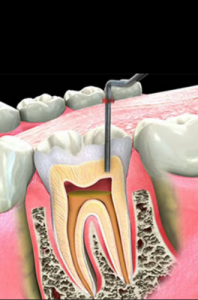 Root canal treatment, also known as endodontic therapy, endodontic treatment, or root canal therapy, is a treatment sequence for the infected pulp of a tooth which is intended to result in the elimination of infection and the protection of the decontaminated tooth from future microbial invasion. Root canals, and their associated pulp chamber, are the physical hollows within a tooth that are naturally inhabited by nerve tissue, blood vessels and other cellular entities. Together, these items constitute the dental pulp. Endodontic therapy involves the removal of these structures, disinfection and the subsequent shaping, cleaning, and decontamination of the hollows with small files and irrigating solutions, and the obturation (filling) of the decontaminated canals.
Root canal treatment, also known as endodontic therapy, endodontic treatment, or root canal therapy, is a treatment sequence for the infected pulp of a tooth which is intended to result in the elimination of infection and the protection of the decontaminated tooth from future microbial invasion. Root canals, and their associated pulp chamber, are the physical hollows within a tooth that are naturally inhabited by nerve tissue, blood vessels and other cellular entities. Together, these items constitute the dental pulp. Endodontic therapy involves the removal of these structures, disinfection and the subsequent shaping, cleaning, and decontamination of the hollows with small files and irrigating solutions, and the obturation (filling) of the decontaminated canals.
Saving the natural tooth with root canal treatment has many advantages:
- Efficient chewing
- Normal biting force and sensation
- Natural appearance
- Protects other teeth from excessive wear or strain
Root canal procedure
A root canal is performed in a dental office. When you arrive for your appointment, a technician will escort you to a treatment room, help you get situated in a chair, and place a bib around your neck to protect your clothes from stains.
Step 1: Anaesthetic
The dentist will place a small amount of numbing medication on your gum near the affected tooth. Once it has taken effect, a local anaesthetic will be injected into your gums. You may feel a sharp pinch or a burning sensation, but this will pass quickly.
You’ll remain awake during the procedure, but the anaesthetic will keep you from feeling any pain.
Step 2: Removing the pulp
When your tooth is numb, the endodontist or general dentist will make a small opening in the top of the tooth. Once the infected or damaged pulp is exposed, the specialist will carefully remove it using special tools called files. They’ll be particularly careful to clean out all the pathways (canals) in your tooth.
Step 3: Antibiotics
Once the pulp has been removed, the dentist may coat the area with a topical antibiotic to ensure that the infection is gone and to prevent reinfection. Once the canals are cleaned and disinfected, the dentist will fill and seal the tooth with a sealer paste and rubber-like material called gutta-percha. They also may prescribe you oral antibiotics.
Step 4: Temporary filling
The dentist will end the procedure by filling the small opening in the top of the tooth with a soft, temporary material. This sealant helps prevent the canals from being damaged by saliva.
Follow-up
Your tooth and gums might feel sore when the numbing medication wears off. Your gums may also swell. Most dentists will have you treat these symptoms with over-the-counter pain medications. Call your dentist if the pain becomes extreme or lasts for more than a few days.
You should be able to resume your normal routine the day after the procedure. Avoid chewing with the damaged tooth until it’s permanently filled or a crown is placed over the top.
You’ll see your regular dentist within a few days of the root canal. They’ll take X-rays to make sure that any infection is gone. They’ll also replace the temporary filling with a permanent filling.
If you prefer, the dentist may place a permanent crown on the tooth. Crowns are artificial teeth that can be made from porcelain or gold. The benefit of a crown is its realistic appearance.
It may take you several weeks to get used to how the tooth feels after the procedure. This is normal and no cause for concern.
Risks
A root canal is performed in an effort to save your tooth. Sometimes, however, the damage is too deep or the enamel is too frail to withstand the procedure. These factors can lead to loss of the tooth.
Another risk is developing an abscess at the root of the tooth if some of the infected material remains behind or if the antibiotics aren’t effective.
If you’re apprehensive about a root canal, you can talk to your dentist about an extraction instead. This often involves placing a partial denture, bridge, or implant in place of the damaged tooth.
When is Root canal suggested?
If the pulp becomes injured or diseased, it cannot repair itself, and the tissue dies.
If there is a deep cavity, a cracked tooth, or a loose filling, bacteria can enter the pulp.
The bacteria will eventually destroy the pulp. If the bacteria penetrate through the root openings, it can cause an infection in the bone.
An infection will weaken the bone and break it down. The ligaments around the tooth will swell, and the tooth will become loose.
A pulp injury will make the tooth sensitive to high and low temperatures. There may be pain when chewing, and some people have a continuous, throbbing pain.
Without treatment, the infection will spread. Eventually, the tooth will become loose and need extracting.
Some patients opt for extraction, especially if it hurts a lot or if the tooth cannot be restored, for example, if there is large decay, trauma, or loss of bone due to periodontal, or gum, disease.
However, removing a tooth may mean that the surrounding teeth start to move and become crooked. This can look unsightly, and it can make it hard to have a good bite.
Prevention
To prevent infections, tooth decay, and gum disease, dentists recommend:
- brushing teeth last thing at bedtime and at least one other time each day
- using toothpaste that contains fluoride
- using a suitable toothbrush and replacing it regularly
- attending regular dental check-ups and cleanings
- flossing to clean between the teeth and prevent the build-up of plaque
- avoiding sugary drinks and foods, and following a healthy diet.
Dental sealants can also prevent decay.











